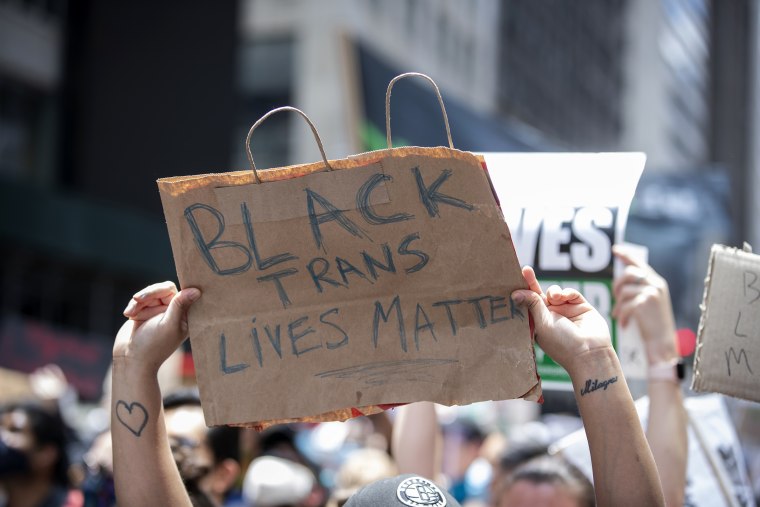During President Barack Obama’s town hall, Reimagining Policing in the Wake of Continued Police Violence, on June 3, he mentioned Tony McDade, the Black transgender man who was shot and killed by police in Tallahassee, Florida. It was a somber moment, but also one where many Black trans men felt seen. Too often the violence against Black transgender people at the hands of the police are ignored when, in fact, transgender people are seven times more likely to experience physical violence when interacting with the police than non-trans people according to the National Coalition of Anti-Violence Programs. And, according to a 2011 report from the National Center for Transgender Equality, nearly half of all Black transgender people have been incarcerated. This is a direct result of Black transgender people being marginalized within our own community and beyond.This movement for Black lives must include us too.
Not only have Black transgender people borne the brunt of the violent police system, we’ve fought against it as well. Black queers, from the civil rights leader Bayard Rustin, who helped organize the 1963 March on Washington, to the co-founders of Black Lives Matter, Patrisse Cullors and Alicia Garza,have helped shape and organize some of the most effective strategies and movements for the equality of Black people.
Race and gender equality go hand in hand for Black LGBTQ people. We can’t pick only one kind of justice because to examine them both is too complicated or makes some us look at our own complacency. Transphobia and sexism are part of white supremacy, and so it all must go. Trans voices cannot be silenced in this moment.
This current civil rights movement has engulfed all 50 states and some 18 countries so far; the heartbreaking, death of George Floyd on May 25 while in the custody of Minneapolis police pushed an already fragile global society over the proverbial edge. It’s easy to understand why.
Just over a month ago, COVID-19 had already ravaged the globe, infecting over 5.6 million people globally and killing more than 350,000. In the U.S. we were about to pass 100,000 deaths, and Black Americans were dying at three times the rate of whites. This administration’s response has been chaotic as best, best characterized by misinformation and decisions that appear to be solely for political gain, leaving millions weary, scared and frustrated.
While the disease ran rampant through Black communities, we all watched in horror when, in early May, a video went viral that showed Ahmaud Arbery‘s horrific killing in Brunswick, Georgia, in February; the two white men who killed him weren’t even charged before the video was released. On March 13, Breonna Taylor was shot in her bed by Louisville, Kentucky, police officers entering her house on a no-knock warrant seeking more evidence on a man already in custody. And then, May 25, there was George Floyd, begging for air and pleading for his mother, under the knee of a white police officer for 8 minutes and 46 seconds.
Black America snapped. White folks could no longer look away.
Then, as the world took to the streets, a recording of Iyanna Dior, a 23-year-old Black trans woman, being brutally attacked after a minor car accident on June 1 surfaced. The irony is that it happened in Minneapolis — the heart of the latest protest for Black lives. They didn’t attack her just because she is Black; they clearly attacked her because she’s transgender. And it is was eerily similar to the case of Muhlaysia Booker, who was assaulted in Dallas, Texas by a group of men in 2019 after a car accident. A month later she was found shot to death; a different man was arrested.
Do people even remember?
This is the time for our progress to be intersectional and intergenerational; if not all of us, then none of us. All Black people deserve to be heard and be seen in this movement, and the Black identity of LGBTQ people isn’t exclusive of our trans and queerness. There can be no hierarchy created to determine which Black lives are more valuable than others. All systemic violence and discrimination against Black people have to be examined.
We also have to be vulnerable enough to confront the ways in which transphobia within Black community sets the stage for violence and trauma. Too often transgender people have been silenced when it comes to conversations about our lived experience with state-sanctioned violence, policing and racism. The time to approach social justice in broader, more honest, terms is now.
The murder of George Floyd was the last straw on top of countless losses and deep grievances for Black America. We’re marching and demanding change, accountability and racial equality — all of which has long been overdue. But we can’t stop there. The change has to include the needs and voices of Black LGBTQ people, or we risk repeating the mistakes we’re rallying against now. The hope is that we get to the other side of the era of COVID-19 and global Black Lives Matter protests, better than how we came into it. But we’re only better together.





